Surface Area Prism Worksheet Answers
Surface Surface area of a Cuboid
Hither we will learn nearly the surface expanse of a cuboid and how to calculate it.
There are too volume and surface area of a cuboid worksheets based on Edexcel, AQA and OCR examination questions, along with further guidance on where to go next if yous're still stuck.
What is the surface expanse of a cuboid?
The area of a cuboid is the total area of all of the faces of a cuboid (or rectangular prism).
The 3 dimensions of a cuboid are width, length and height.
Cuboids take 3 pairs of identical faces – top and bottom, front and back, and left and right.
To piece of work out the total surface area of a cuboid, nosotros need to work out the expanse of each rectangular face up and add together them all together.
E.1000. Detect the surface area of a cuboid.
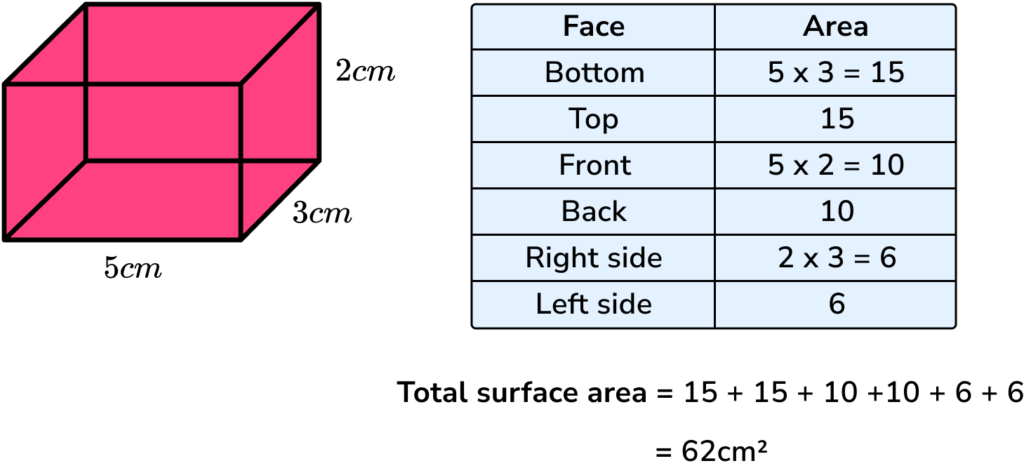
Since information technology is an area, surface surface area is measured in square units (east.g. mm^2, cm^2, 1000^2 etc).
What is the expanse of a cuboid?
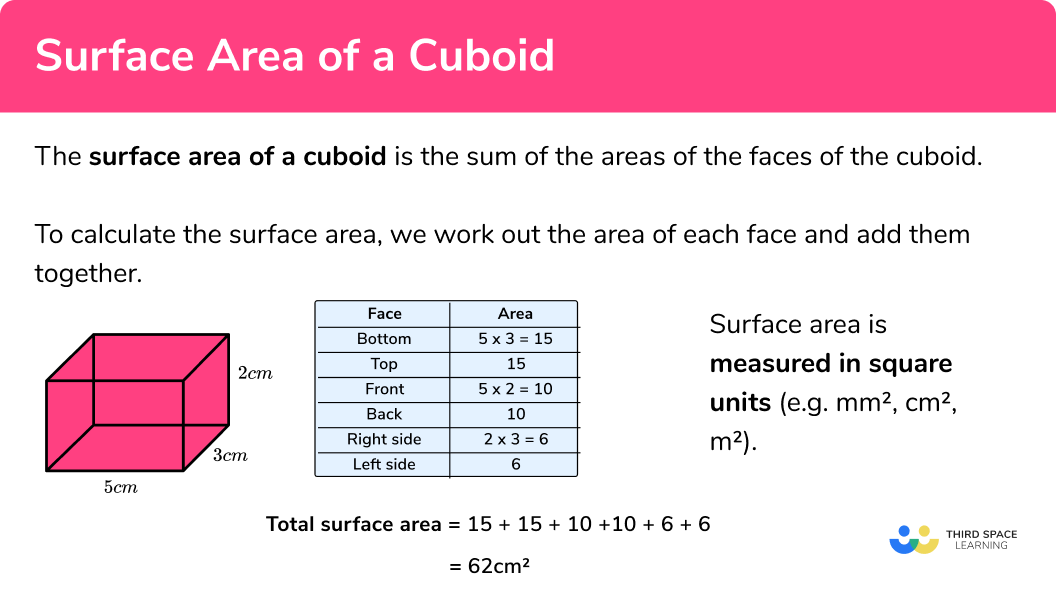
How to calculate the surface area of a cuboid
In gild to piece of work out the area of a cuboid:
- Work out the area of each face.
- Add the half dozen areas together.
- Include the units.
How to calculate the surface area of a cuboid
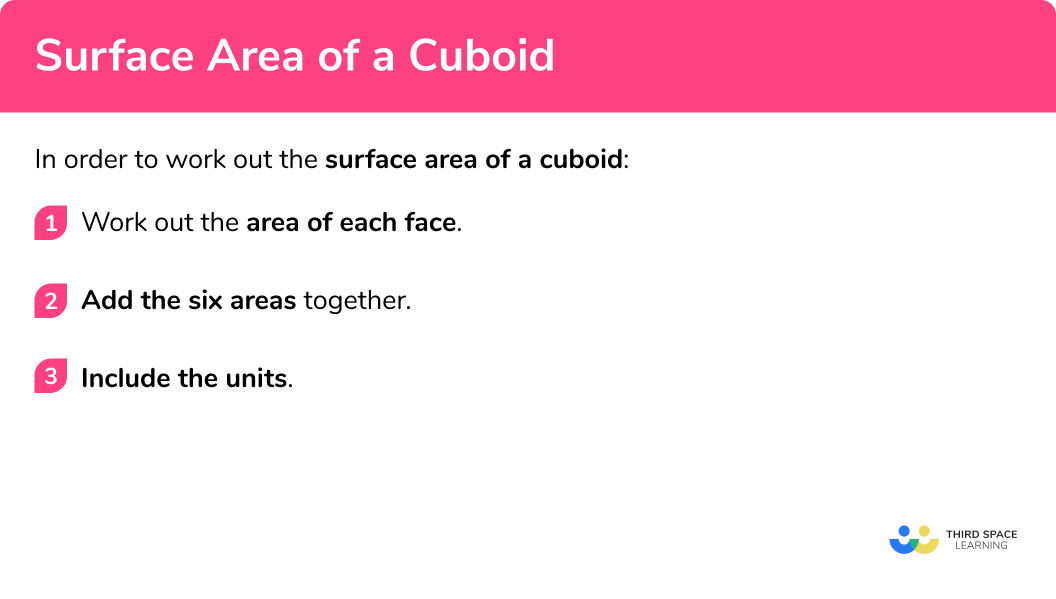
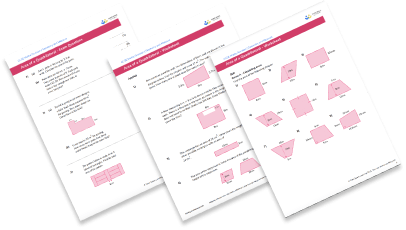
Surface area of a cuboid worksheet

Go your free expanse of a cuboid worksheet of 20+ questions and answers. Includes reasoning and applied questions.
DOWNLOAD Free

Surface expanse of a cuboid worksheet

Get your free expanse of a cuboid worksheet of 20+ questions and answers. Includes reasoning and applied questions.
DOWNLOAD Gratuitous
Expanse of a cuboid examples
Example 1: surface area of a cuboid
Piece of work out the surface area of the cuboid
- Piece of work out the area of each face.
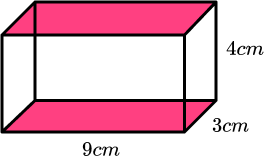
The area of the lesser is nine\times3=27cm^ii .
The top face is the same every bit the bottom face then the area of the top is too 27cm^2 .
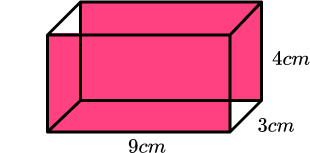
The area of the front is 9\times4=36cm^2 .
The dorsum face is the same equally the front face and so the area of the back is also 36cm^2 .
The area of the right hand side is three\times4=12cm^2 .
The left side face is the same as the right side face so the area of the left side is also 12cm^2 .
It will make our working clearer if we use a table:
| Face | Area |
| Bottom | nine×iii=27 |
| Top | 27 |
| Forepart | ix×4=36 |
| Back | 36 |
| Right side | three×four=12 |
| Left side | 12 |
2 Add the six areas together.
The sum of the areas is: 27+27+36+36+12+12=150
iii Include the units.
The measurements on the cuboid are in cm therefore the total expanse of the cuboid = 150cm^2 .
Example ii: surface area of a cuboid
Piece of work out the surface area of the cuboid
Work out the expanse of each face.
| Face | Area |
| Lesser | half-dozen×3=18 |
| Top | 18 |
| Front end | nine×6=54 |
| Back | 54 |
| Right side | 9×3=27 |
| Left side | 27 |
Add the half-dozen areas together.
18+18+54+54+27+27=198
The measurements on the cuboid are in mm therefore the total surface area of the cuboid = 198mm^ii .
Case three: surface surface area of a cube
Piece of work out the surface expanse of this cube
Piece of work out the area of each confront.
Each face of a cube is the same. For this cube, the area of each face up is 8\times8=64cm^2
Add together the six areas together.
half-dozen\times64=384
The measurements on the cube are in cm therefore the total surface surface area of the cube = 384cm^ii .
Instance 4: surface area with dissimilar units
Work out the surface area of this cuboid
Work out the area of each face.
Notice that one of the measurements is in metres and the rest are in centimetres. Before nosotros tin calculate any areas, nosotros need to ensure all units are the aforementioned. In this case, 0.1m=10cm and so nosotros can use 10cm .
| Face up | Area |
| Bottom | 8×10=lxxx |
| Top | 80 |
| Front | 8×2.v=xx |
| Back | 20 |
| Right side | 10×ii.5=25 |
| Left side | 25 |
Add together the 6 areas together.
80+fourscore+20+twenty+25+25=250
The measurements nosotros have used are in cm therefore the total surface area = 250cm^2 .
Example 5: surface surface area using algebra
Work out the surface area of this cuboid.
Work out the area of each face.
| Face | Expanse |
| Bottom | xiv×10=14x |
| Height | 14x |
| Front end | 14×vi=84 |
| Back | 84 |
| Right side | 6×ten=6x |
| Left side | 6x |
Add the six areas together.
14x+14x+84+84+6x+6x = 40x+168
The measurements we have used are in cm therefore the total surface surface area = (40x+168) cm^two .
If we are told the value of the surface area, nosotros tin can utilize the expression we take found to work out the value of x .
Let's say the surface surface area of this cuboid is 328cm^2 . And then we can say:
40x+168=328 .
Now we can solve this equation:
40x+168=328
40x=160
ten=4cm
The width of this cuboid is 4cm .
Example half-dozen: surface surface area using algebra
Work out the surface area of this cuboid
Work out the area of each face.
| Face | Area |
| Bottom | 10×4y=40y |
| Top | 40y |
| Front | 10×2y=20y |
| Back | 20y |
| Correct side | 2y×4y=8ytwo |
| Left side | 8y2 |
Add the six areas together.
40y+40y+20y+20y+8y^2+8y^two= 16y^2+120y
The measurements we take used are in grand therefore the full surface area = (16y^2+120y) yard^2 .
Common misconceptions
- Calculating volume instead of expanse
Volume and surface area are dissimilar things – volume is the space within the shape whereas surface expanse is the total area of the faces. To find surface area, nosotros need to piece of work out the area of each face up and add together them together.
- Equal faces
A mutual mistake is to retrieve that 4 of the faces are equal.
Eastward.g.
The offset pair of faces are equal to each other.
The 2d pair of faces are equal to each other.
The third pair of faces are equal to each other.
Surface expanse of a cuboid is part of our serial of lessons to back up revision on cuboid. You may notice information technology helpful to start with the principal cuboid lesson for a summary of what to expect, or apply the footstep by step guides below for further detail on individual topics. Other lessons in this series include:
- Cuboid
- Book of a cuboid
Practice surface area of a cuboid questions




Work out the area of each of the six faces:
| Confront | Area |
| Lesser | 7× xv=105 |
| Top | 105 |
| Forepart | 3× 15=45 |
| Back | 45 |
| Right side | 3× 7=21 |
| Left side | 21 |
\text{Total surface area: }105+105+45+45+21+21=342\mathrm{cm}^{two}




Since it is a cube, all of the faces are the same. The surface area of each face up is 4\times 4=16\mathrm{cm}^{2} . In that location are six identical faces therefore the total expanse of the cube is vi \times 16=96 \mathrm{cm}^{ii}




Some of the measurements are in one thousand and one is in cm. Nosotros need all of the measurements to be in the aforementioned units so catechumen the metres to centimetres. 0.7m=70cm and 0.4m=40cm . Now we can summate the areas:
| Face | Area |
| Lesser | 70× xv=1050 |
| Height | 1050 |
| Front | 70× twoscore=2800 |
| Back | 2800 |
| Right side | 40× 15=600 |
| Left side | 600 |
\text{Total surface area: } 1050+1050+2800+2800+600+600=8900\mathrm{cm}^{two}




Work out the area of each of the six faces:
| Confront | Expanse |
| Lesser | five× a=5a |
| Summit | 5a |
| Front | three× a=3a |
| Back | 3a |
| Right side | 3× 5=15 |
| Left side | 15 |
\text{Total surface area: } 5a+5a+3a+3a+xv+15=(16a+30) \mathrm{cm}^{2}


(4b^{2}+48b) \mathrm{mm}^{2}

(8b^{2}+16b) \mathrm{mm}^{2}

Work out the area of each of the 6 faces:
| Confront | Expanse |
| Bottom | 8× b=8b |
| Peak | 8b |
| Front | b× 2b=2 b 2 |
| Back | 2 b 2 |
| Right side | 8× 2b=sixteen b |
| Left side | 16 b |
\text{Full surface expanse: }8b+8b+2b^{ii}+2b^{ii}+16b+16b=(4b^{2}+48b)mm^{2}




Piece of work out the area of each of the six faces:
| Face | Area |
| Bottom | 7× x=7x |
| Top | 7x |
| Front | iii× ten=3x |
| Back | 3x |
| Right side | three× vii=21 |
| Left side | 21 |
\text{Total surface area: }7x+7x+3x+3x+21+21=20x+42
Since we know the surface expanse is 142\mathrm{cm}^{2}
nosotros can say:
20x+42=142\\ 20x=100\\ x=5\mathrm{cm}
Surface expanse of a cuboid GCSE questions
1. Calculate the surface area of the cuboid.
(three marks)
Evidence answer
Two of:
12\times iii.5=42\\ 12\times 4=48\\ iv\times 3.five=14
(1)
42+42+48+48+xiv+fourteen
(i)
208\mathrm{cm}^{2}
(1)
2. A breakfast cereal producer wants to produce a cereal box with a book of 4800cm^3 . The visitor wants to utilise as little paper-thin equally possible for each box. Should they use box A or box B ? You must show your working.
(5 marks)
Testify reply
Box A expanse: 160+160+600+600+240+240
(1)
\text{Expanse }=2000\mathrm{cm}^{2}
(1)
Box B surface expanse: 192+192+480+480+250+250
(1)
\text{Surface area }=1844\mathrm{cm}^{2}
(ane)
They should utilise box B
(one)
three. John wants to paint iv identical doors, as shown below.
1 litre of paint will embrace
x\mathrm{m}^{two}
John has 1 litre of paint. Does he take enough paint to cover all 4 doors? You must show your working.
(5 marks)
Show answer
5cm = 0.05m
(ane)
Area of 1 door: 0.03+0.03+1.ii+1.2+0.1+0.1
(1)
\text{Surface area of 1 door }=2.66\mathrm{m}^{two}
(ane)
\text{Surface surface area of 4 doors: }4 \times 2.66=10.64\mathrm{chiliad}^{2}
(i)
No he does not accept plenty paint
(ane)
Learning checklist
You accept now learned how to:
- Calculate the surface surface area of a cuboid
- Utilise the backdrop of faces, surfaces, edges and vertices of cubes and cuboids to solve issues in 3D
Still stuck?
Ready your KS4 students for maths GCSEs success with Third Infinite Learning. Weekly online 1 to one GCSE maths revision lessons delivered by skilful maths tutors.

Detect out more than about our GCSE maths revision programme.
Surface Area Prism Worksheet Answers,
Source: https://thirdspacelearning.com/gcse-maths/geometry-and-measure/surface-area-of-a-cuboid/
Posted by: mossgess1946.blogspot.com


0 Response to "Surface Area Prism Worksheet Answers"
Post a Comment